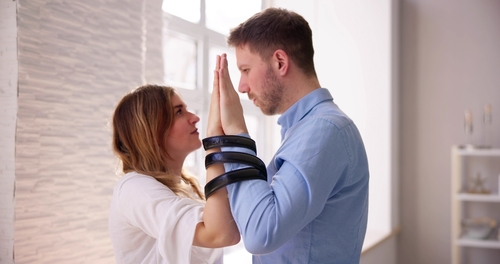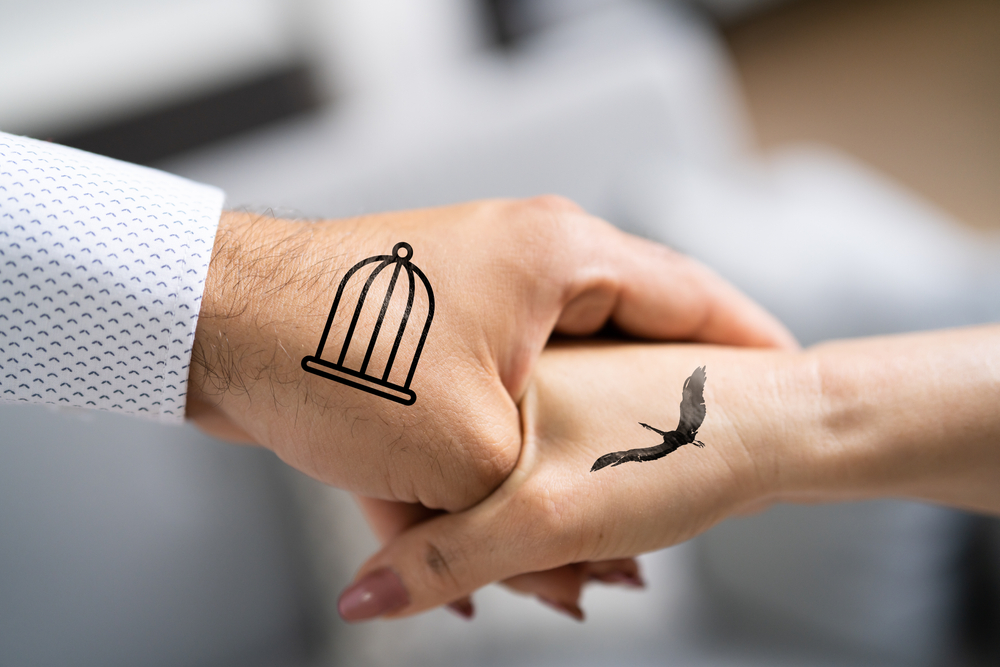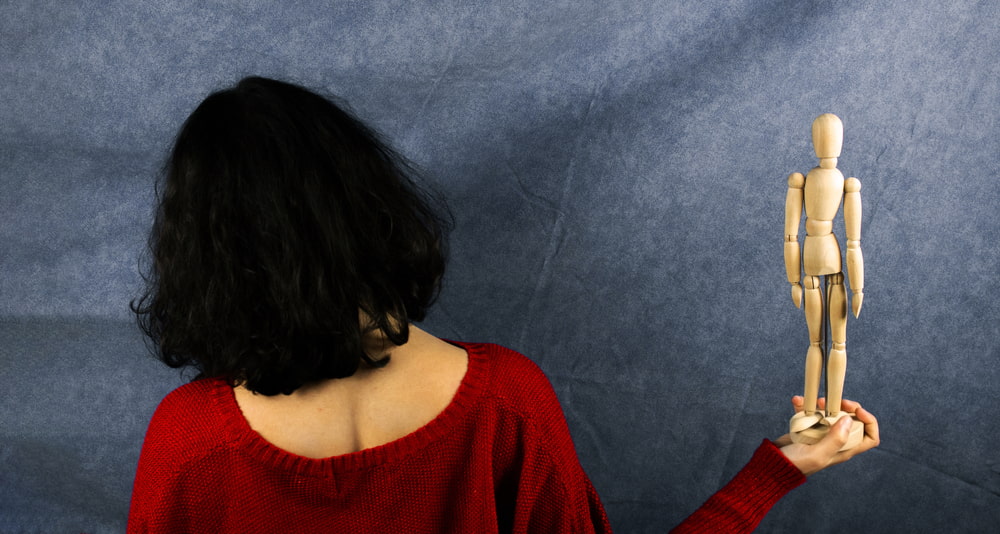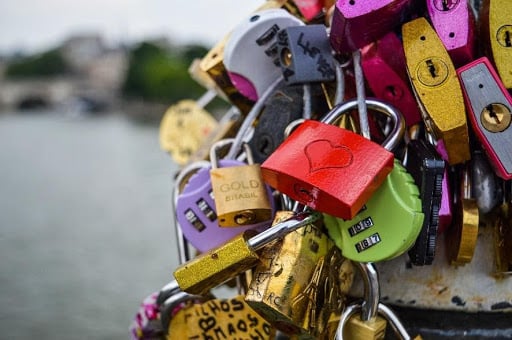Codependency is a dysfunctional pattern of behavior where one person’s (“Giver”) emotional and physical needs become wholly reliant on those of another person (“Taker”). This unhealthy dynamic, often progressing through distinct stages of codependency, typically involves the Giver sacrificing their own well-being, happiness, and identity to cater to the needs of the taker, even to the point of enabling harmful behavior, creating the dynamics of a codependent partner.
This is why codependency is sometimes referred to as “love addiction” or “relationship addiction”. The Giver can develop unhealthy behavioral patterns and the need for external validation, leading to a lack of emotional regulation and a sense of helplessness.
Codependent behavior effectively traps both parties in a vicious cycle of giving and taking, forming a declining spiral that hinders the personal growth of everyone involved, as well as introducing even more elements of dysfunction into the relationship.
Fortunately, there is a silver lining here. Forming codependency is a gradual process. It develops in several stages and that takes time. This means that it is possible to break the cycle of dependency at any point during the process, even if it already became a default operating behavior.
Doing so will often require some degree of professional aid, either through continuous visitations to intensive codependency workshops or staying in one of the retreats near you. However, to discern which option is right for solving your issues of codependency, it is important to recognize the stage you’re currently at.
[quiz categories=”codependency”]
Understanding Codependency
Codependency is a tricky thing to understand and get your head around. At it’s core it’s a pattern of behavior where one person’s emotional and psychological well being becomes deeply tied to another person, often to the point of enabling or supporting unhealthy or destructive behavior. This can show up in many ways including an obsession with control, no boundaries and putting others needs before your own.
The roots of codependency can often be traced back to childhood trauma, low self esteem and no healthy relationship models. For example people who grew up in environments where their emotional needs were not met may develop codependent tendencies as a way to get validation and love. And societal and cultural norms that promote self sacrifice and putting others first can perpetuate these behaviors.
But the consequences of codependency can be severe. Over time a codependent person can lose their own identity and feel empty and worthless inside. This can also lead to stress related disorders like anxiety and depression making their mental health even more complicated. Recognizing and addressing these patterns is key to having healthier more fulfilling relationships.
What Are The Stages Of Codependency?

While codependency is not an official diagnosis or a fixed trait, it may be difficult to define it as a stand-alone issue. However, viewing it through the lens of addiction, we can see several patterns emerging.
Firstly, codependency is a chronic condition, characterized by enduring and progressive symptoms. This means that, if left unattended, the symptoms will become increasingly worse over time.
Secondly, the severity of the symptoms varies on the continuum, ranging from mild to severe, and may include:
- Dependency on another person for validation and actualization;
- Craving the (unhealthy) interaction;
- Inability to abstain from compulsive behavior;
- Continuous (unsuccessful) attempts to control the interaction;
- Giving up joyful activities, such as hobbies or socializing, in order to focus on the unhealthy habit;
- Maintaining harmful behavioral patterns, despite the problems they create in personal or professional life.
The emotional and relational challenges of codependency can lead to an imbalance in the relationship, causing distress and strain for one or both partners.
Lastly, recovering from codependency often requires intervention by a professional. Recovery is a gradual process that takes time, but with the help of codependency coaching or treatment by a mental health specialist, it can be overcome with great success.
With the above factors as a baseline and substance use disorder (SUD) as a parallel, we can define stages of codependency on a spectrum, as follows:
- Early stage;
- Middle stage;
- Late stage.
Similarly to different types of addiction, each stage becomes progressively detrimental to an individual and harder to manage without professional assistance, the longer it is left unattended.
What Are The Characteristics Of Different Codependency Stages?
As we already mentioned, codependency is a gradual process. It usually starts with a deep desire to help and care for someone, as well as a genuine dedication to achieving that goal. However, over time and if taken to the extreme, this behavior can become unhealthy and even harmful, which is why it is essential to learn to recognize the characteristics of each stage.

Stage 1: Early Stage

The first stage is also known as the “Caretaker stage” and it is the hardest one to notice, both for the individual and those in their surrounding since it often resembles a harmonious and dedicated relationship.
During this time, the Giver typically exhibits a strong urge to take care of their partner and avoid conflict at all costs, usually at the expense of their own personal physical, mental, and emotional needs.
They may even feel a sense of pride in their dedication and ability to please their partner, especially considering that they often receive positive feedback and validation from others (including the partner) for their actions.
However, as time goes on, this type of behavior can become increasingly unhealthy and even harmful, as The Giver starts:
- Neglecting their own needs and desires, leading to feelings of resentment and burnout;
- Feeling guilty when they prioritize themselves over their partner, out of the sense of obligation to care for the Taker;
- Having difficulties expressing themselves or setting boundaries for their own benefit;
- Drifting away from their family and friends, in order to have more time to care for their partner;
- Exhibiting fear of rejection or abandonment, resulting in even deeper determination to put the other person’s needs before their own.
Ultimately, the combination of the above factors will lead to the Giver experiencing an even lower sense of self-esteem and a greater desire for external validation. Considering how low self-esteem is one of the prime contributors to codependency forming, it is easy to conclude that the person will find it increasingly difficult to escape the clutches of this behavioral pattern.
Stage 2: Middle Stage

Also known as the “Controller stage”, this phase is characterized by an increased dependence on the partner and a corresponding loss of focus on self-care. During this stage, the Giver’s self-esteem continues to plummet, and they typically begin to cultivate the desire to control and criticize their loved one’s actions and behaviors.
However, this is entirely counterproductive, since the main tools employed here are usually manipulation and inducing guilt. What this does is trap the person in the endless cycle of anxiety and self-guilt instead, ultimately leading to a sense of resentment, disappointment, and anger toward the person they’re trying to please.
At this point, codependency is deeply ingrained in the Giver’s psyche, which often causes them to find a different way to cope with pain and anguish, usually by adopting another compulsive behavior, such as obsessive working or even SUD.
Stage 3: Late Stage

The final phase of codependency is the “Victim stage” or, as some call it, the “Martyr stage”. At this point, the Giver may feel completely trapped in their relationship and powerless to change their situation. They’ve usually almost completely lost touch with their own needs and desires, as well as their sense of identity outside of the one provided by the Taker.
The symptoms that started building during the previous stage become more exacerbated, which may lead to depression, anxiety, and anger issues. In addition to psychological problems, the pent-up stress of being in a dysfunctional relationship without a way out often results in physical issues, such as insomnia, headaches, sciatica, eating disorders, and digestive problems.
Recognizing the Signs of a Codependent Relationship
Knowing the signs of a codependent relationship is key to getting help. Some of the signs are:
- No healthy communication or conflict resolution skills.
- Needing control or trying to control your partner.
- No boundaries or putting your partner’s needs before your own.
- Enabling or supporting unhealthy or destructive behaviors.
- Rationalizing or justifying bad behavior.
- No self care or neglecting your own needs and desires.
- People pleasing or putting others needs before your own.
The Importance of Self-Care in Recovery
Self care is a big part of codependency recovery. When we take care of ourselves we are better able to set healthy boundaries, communicate effectively and develop a stronger sense of self. Self care can look like:
- Doing things that bring you joy.
- Practicing mindfulness and self kindness.
- Setting boundaries and putting your own needs first.
- Getting support from friends, family or a therapist.
- Exercising.
- Getting enough sleep and good sleep hygiene.
When we take care of ourselves we can start to break free from codependency patterns and develop a healthier more fulfilling relationship with ourselves and others. This is codependency recovery and also empowers and self worth which means more balanced and healthy relationships in the future.
Start Your Journey to Healthy Relationships Today—Discover PIVOT’s Transformative Codependency Coaching and Retreats
Whether you’re struggling in a codependent relationship or simply looking to build stronger boundaries and self-care practices, turning to PIVOT’s codependency treatment centers near you will provide you with the guidance and resources you need to create lasting change in your life.

Our intense codependency workshops are designed to help you break free from patterns of self-sacrifice and people-pleasing, and prioritize your own well-being. Led by experienced coaches and held in a serene Glass House retreat setting, our facilities offer a safe and supportive environment for self-discovery and personal growth.







